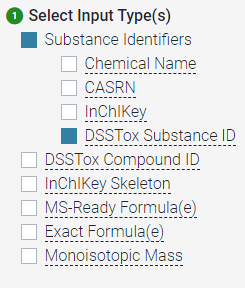In step 1. the user can select one of six input types:
Substance Identifiers: A mixture of chemical name, CASRN, InChlKey, and DSSTox Substance IDs. Name includes synonyms. The user must specify which of the four are included in the input.
- Chemical Name: Input systematic names, trade names or synonyms, one to each line, before executing the batch search.
- CASRN: The CASRN is the Chemical Abstracts Service Registry Number. The search includes validation based on a checksum calculation and includes other input error handling.
- InChIKey: The InChIKey search performs an exact match search based on the InChiKey thereby matching charge, isotopes and stereochemistry explicitly. For a more general search perform an InChIKey skeleton search which will match based on connectivity only.
- DSSTox Substance ID: The DTXSID corresponds to the DSSTox Substance Identifier. This unique identifier includes a check digit.
DSSTox Compound ID - The DTXCID is the DSSTox Chemical Identifier, a unique identifier associated with a chemical structure on the dashboard.
InChIKey Skeleton - The first part of an InChIKey represents the atom-bond connectivity for a chemical and ignores stereochemistry, isotope labels, and charge states. Searching on the InChIKey will find all chemicals based on the molecular skeleton.
MS-Ready Formula(e) - This search is based on what we refer to as “Mass Spec (MS) Ready” structures. All chemicals within the database are treated in a manner such that all are desalted, mixtures are separated, and stereochemistry is removed as Mass Spectrometry detects the major components of a salt or mixture and is insensitive to stereochemistry. As an example, a search for the monoisotopic mass of phenol will return phenol, sodium phenolate and calcium phenoxide. See the publication for more details: https://doi.org/10.1186/s13321-018-0299-2 EXIT.
Exact Formula(e) - The Exact Formula Search is the formula associated with single component chemicals as well as multicomponent mixtures and salts.
Monoisotopic Mass - This search is based on what we refer to as “Mass Spec (MS) Ready” structures. All chemicals within the database are treated in a manner such that all are desalted, mixtures are separated, and stereochemistry is removed as Mass Spectrometry detects the major components of a salt or mixture and is insensitive to stereochemistry. As an example, a search for the monoisotopic mass of phenol will return phenol, sodium phenolate and calcium phenoxide. See the publication for more details: https://doi.org/10.1186/s13321-018-0299-2 EXIT.
NOTE: when this option is selected an additional drop-down menu appears which allows selection of mass search bounds from +/- 1 to +/- 10 ppm.

